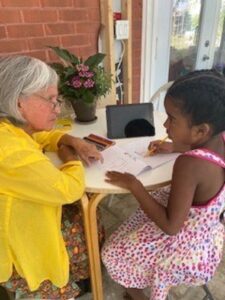Grandmother and granddaughter take opportunity to learn together during pandemic

By Rick Garrick
PETERBOROUGH — Grade 1 student and Aundeck Omni Kaning First Nation citizen Jada McGregor-Dickens enjoyed doing her schoolwork with her grandmother Jackie Esquimaux-Hamlin during the coronavirus disease 2019 (COVID-19) pandemic.
“We found out I can read!” McGregor-Dickens says. “I missed my friends a lot.”
McGregor-Dickens also enjoyed the opportunity to visit a landfill site during her stay with her grandparents in Peterborough.
“It was very amazing because I never saw a landfill [before],” McGregor-Dickens says.
Esquimaux-Hamlin, an Aundeck Omni Kaning citizen who retired to Peterborough after about 18 years at the University of Toronto’s First Nations House, says McGregor-Dickens had been visiting during March Break, but when her school was closed due to the COVID-19 lockdown, she and her daughter decided to let McGregor-Dickens stay in Peterborough because of all of the restrictions in Toronto.
“In [Toronto], they closed down all the parks,” Esquimaux-Hamlin says. “They live in an apartment in the city and there is no balcony or a backyard, so we felt it was better for her to be here out in the country. She can be outside and learn those outside skills, get outside and play.”
Esquimaux-Hamlin says her partner built a treehouse for McGregor-Dickens on their property, which is located on the outskirts of Peterborough.
“She was out there helping her grandfather clean the land,” Esquimaux-Hamlin says. “So she was on the land doing things, [learning] how to clean it up and keep it in order.”
Esquimaux-Hamlin says McGregor-Dickens enjoyed doing her online education with her teacher in Toronto.
“Her teacher was phenomenal,” Esquimaux-Hamlin says. “She would send me every day her work and we would look at the page. There was a literacy assignment and there was a math assignment that we did every day.”
Esquimaux-Hamlin says her early childhood educator background was an advantage during the education sessions. McGregor-Dickens usually began her day by walking the dog and having breakfast.
“We would start [the sessions] by nine o’clock, like at school,” Esquimaux-Hamlin says. “They do the recognition of the land acknowledgement at her school, so we would listen to that and then I would tell her what the teacher wanted us to do and we would start on that.”
Esquimaux-Hamlin says they used information from Native Child and Family Services of Toronto’s Instagram account for the cultural component of her education.
“We got to sing songs in Anishinaabemowin and it was good,” Esquimaux-Hamlin says. “We had fun with that.”
Esquimaux-Hamlin says her granddaughter soon recognized it would be best to get her schoolwork done as soon as possible so she could go outside and play or do whatever she wanted for the rest of the day.
“We had some beautiful days,” Esquimaux-Hamlin says. “She was going back down on the field, climbing up in her treehouse, climbing the rocks, swimming in the water.”
Esquimaux-Hamlin says her granddaughter usually video-chatted with her mother in the morning, at lunch and in the evening.
“Eventually we did go up to Toronto and she got to see her mom after almost nine weeks,” Esquimaux-Hamlin says. “She was ecstatic.”
Esquimaux-Hamlin says her daughter lives in an area north of The Beaches in Toronto.
“There was a park just down the street but you couldn’t go to the park because they were all closed off,” Esquimaux-Hamlin says. “Here, she could go out and play.”


